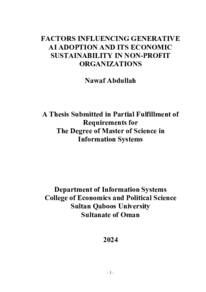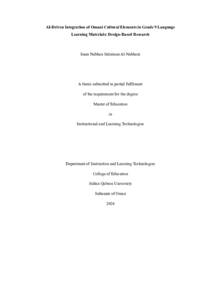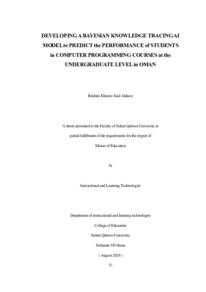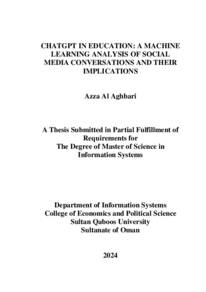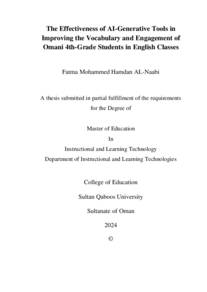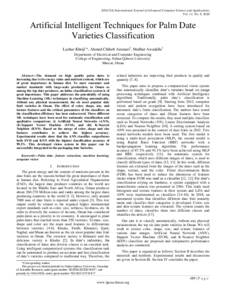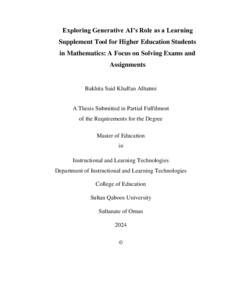Document
Factors influencing generative AI adoption and its economic sustainability in non-profit organizations.
Source
Master's thesis
Other titles
عوامل تؤثر على تبني تقنيات الذكاء الاصطناعي التوليدي وأثرها على الاستدامة الاقتصادية : حالة المنظمات غير الربحية
Country
Oman
City
Muscat
Publisher
Sultan Qaboos University
Gregorian
2024
Language
English
Thesis Type
Master's thesis
English abstract
As an emerging technology, Generative Artificial Intelligence (GAI) is assumed to
be one of the most effective technologies across various levels of management. Yet,
current studies have yet to investigate the factors that affect the adoption of
generative AI tools among employees in the workplace and its impact on the
organization's economic sustainability. This study aims to contribute to our
understanding of GAI adoption and usage factors in organizations and their impact
on economic sustainability in the context of Non-Profit Organizations (NPOs). It
extends the UTAUT theory with AI attributes and privacy risk factors. A quantitative
methodology was followed, and the survey was used as an instrument. Random
Sampling technique was followed and data from 302 employees were collected from
NPO organizations and analyzed, leading to valuable insights and implications. The
results show that most of the factors significantly affect GAI adoption, such as
Facilitating Conditions, Performance Expectancy, Privacy risks, Social Influence,
Perceived Anthropomorphism, and Perceived Animacy. Surprisingly, two factors
were not significant: effort expectancy and perceived intelligence. Also, the effect of
using GAI on economic sustainability is significant. The model explained GAI
adoption with 62.7% predicting power. These results shed light on the importance of
encouraging employees to use GAI in the workplace while ensuring that robust data
protection measures are covered to waive employee concerns.
Arabic abstract
يعتبر الذكاء الاصطناعي التوليدي من التقنيات الحديثة وواحدة من أكثرها فعالية في مختلف مستويات الادارة. مع ذلك، لا زالت الدراسات الحالية لم تبحث بعد العوامل المؤثرة على تبني أدوات الذكاء الاصطناعي التوليدي عند الموظفين في مكان العمل وتأثير هذا التبني على الاستدامة الاقتصادية للمنظمة. هذه الدراسة تهدف للمساهمة في فهم العوامل المؤثرة لتبني واستخدام أدوات الذكاء الاصطناعي التوليدي في المنظمات وتأثيرها على الاستدامة الاقتصادية في سياق المنظمات غير الربحية. توسع هذه الدراسة نظرية UTAUT الخاصة بتبني التقنيات بإضافة عوامل الذكاء الاصطناعي والمخاطر المتعلقة بالخصوصية. اتبعت الدراسة المنهج الكمي واستخدمت الاستبيانات كأداة. استجاب عدد 302 موظف من منظمات غير الربحي الكويتي لالستبيان الذي بعد تحليله تبينت معلومات وآثار هامة. أظهرت النتائج أن أكثر العوامل المؤثرة على تبني تقنيات الذكاء الاصطناعي التوليدي كانت الظروف الميسرة والاداء المتوقع والتأثير الاجتماعي ومخاطر الخصوصية والتجسيم المدرك والحيوية المدركة. بينما على غير المتوقع لم يكن لعوامل الجهد المتوقع والذكاء المدرك أظهرت النتائج أيضا استخدام تقنية الذكاء الاصطناعي التوليدي لها تأثير إيجابي على الاستدامة ً أهمية. أن الاقتصادية للمنظمات. كان النموذح المستخدم في الدراسة يفسر الظاهرة بقوة تنبؤية وصلت إلى .%62.7 تسلط هذه النتائج الضوء على أهمية تشجيع الموظفين على استخدام هذه التقنيات في مكان العمل مع ضمان توفير التدابير اللازمة لحماية خصوصة البيانات التي تطمئن مخاوف الموظفين
Category
Theses and Dissertations

